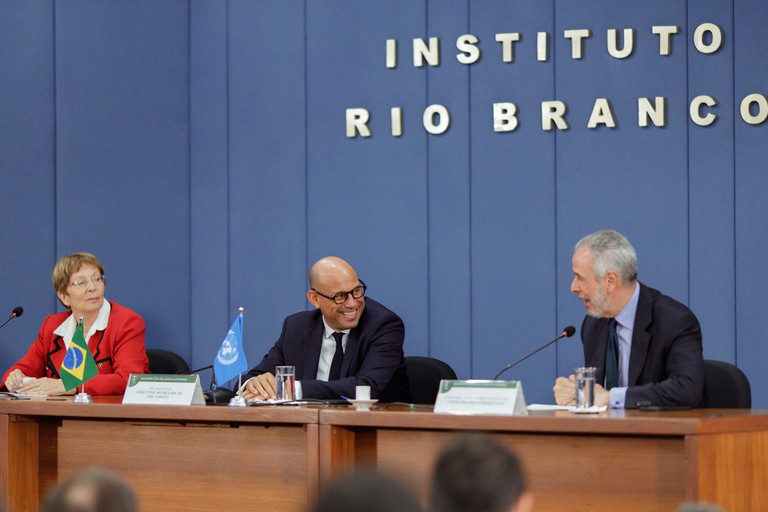"Brasil will be an ambitious leader" at COP30 Amazônia, says UN Executive Secretary
"With its vision, strong leadership, and commitment to climate action, Brasil will be an ambitious leader", declared Simon Stiell, UN Executive Secretary for Climate Change, during an event in Brasilia

UN Executive Secretary for Climate Change Simon Stiell underscored Brasil’s importance as a key negotiator for climate issues during a presentation on the United Nations Framework Convention on Climate Change (UNFCCC) for diplomats in training at the Rio Branco Institute this Thursday, February 2nd, in Brasilia. Also present at the event were the President of COP30 Amazônia, Ambassador André Corrêa do Lago, and the Institute's Director General, Mitzi Valente da Costa.
Following the Brazilian Government's initiatives for COP30 since the beginning, Stiell reiterated that “when President Lula announced his interest in hosting the COP30, the UNFCCC knew that, with his vision, strong leadership, and commitment — not only to the climate action process but also to internal action in his country,” Brasil would be “an ambitious leader”.
Ambassador Corrêa do Lago recalled that the UNFCCC was born during Rio-92, a conference that marked the global commitment to the climate agenda. It was there that the principle of common but differentiated responsibilities was consolidated, recognizing that developed countries are primarily responsible for the worsening environmental crisis and that developing nations need financial and technological support to ensure a fair and sustainable transition. “The times we are living in are ideal for testing the limits of the possibilities ahead of us,” highlighted the Brazilian ambassador.
The clean energy revolution
Stiell underscored significant advancements in the energy sector. According to the UN secretary, in 2024, global investment in clean energy surpassed the 2 trillion dollar mark for the first time. Since 2020, spending on renewable energy has exceeded investments in fossil fuels, according to data from the International Energy Agency.
“The transition to clean energy represents a colossal scale of economic opportunities,” stated Stiell. He also highlighted that countries leading this transformation are reaping benefits such as economic growth, job creation, less pollution, reduced public health costs, and a safer, more accessible energy matrix.
Transition challenges in the Global South
In spite of large capital flows to promote the green economy, two-thirds of the world is still unable to access these resources to bolster large-scale climate actions. For Stiell, this barrier underscores the urgent need for global governance reform, an issue to be discussed during Brazil’s BRICS Presidency in 2025.
“A country may back down, but others are already positioning themselves to take the lead and reap the benefits of climate action,” Stiell warned. According to the UN climate change head, it is crucial that all countries have fair access to the opportunities generated by the energy transition, avoiding further deepening of global inequality.
Agenda for action for COP30 Amazônia
This week, Simon Stiell will lead the high-level mission of the UNFCCC Secretariat in Brasilia. The meetings aim to discuss with the Brazilian Government and the teams engaged in the preparations for COP30 — which will take place in November in Belém, Pará — the perspectives of the various negotiation areas and the definition of an ambitious, relevant, and inclusive agenda for action for the Conference.

